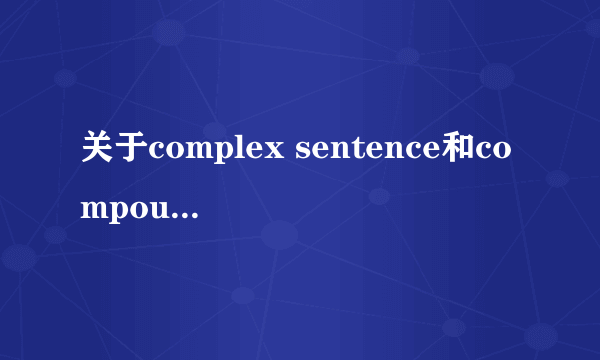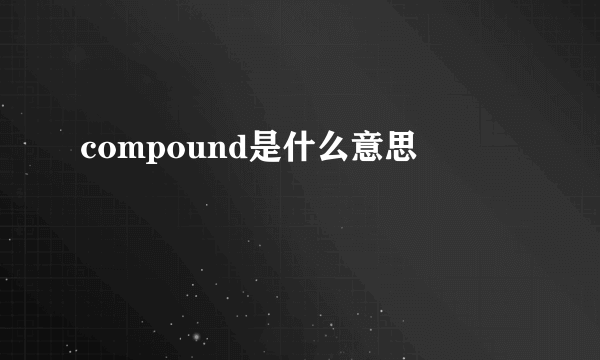关于complex sentence和compound sentence的问题
的有关信息介绍如下:
并列句(Compound Sentence)
并列句有两个或两个以上的主谓结构。这些主谓结构之间的关系是并列的、对等的。从语法上讲,所谓"并列"、"对等"是指任何一个主谓结构都能独立地表达意思,谁也不从属于谁。尽管如此,这些主谓结构在意思或逻辑上有一定程度的内在联系。否则,它们就可能被分别写成简单句,而没有必要写在一起构成并列句了。在并列句中,要使两个或几个主谓结构(或者说,分句)连接在一起,就要用并列连词。并列连词用来连接平行对等(即互不从属)的分句。按其表示的不同意思有下面几种:
表示转折意思 : but , yet , however , nevertheless
例:Everything in the world is outside you but health belongs to yourself .
一切都是身外之物,只用健康属于自己。
He has learned English for only one year, yet he can communicate with people in English . 他才学一年英文,但已能用英文与人交往了。
John has his shortcomings; however, that doesn't mean he is not qualified for the job . 约翰有缺点,但这不等于说他不胜任这份工作。
表示因果关系: or , so , therefore , hence
例:You'd better take an umbrella with you, for it's going to rain. 要下雨了,你最好带把伞。
I've got a meeting to attend, so I have to go now. 我要去开个会,我得走了。
You are in the right , therefore we should support you . 你是对的,所以我们该支持你。
The town was built on the side of a hill, hence it's named Hillside . 这个小镇建在山旁,所以叫"山旁"。
表示并列关系
and , or , either…or , neither / nor , not only…but (also), both…and , as well as
例:She came to my house yesterday evening, and Iwent to hers . 昨晚她来我家了,我却去她家了。
Do it this way or you'll be in trouble . 你就这么办,不然你会有麻烦的。
Either you tell him the truth , or I do it . 不是你告诉他事实,就是我来告诉。
He doesn't know your address, neither / nor do I. 他不知道你的地址,我也不知道。
复合句(Complex Sentence)
复合句明显地不同于简单句,因为它有两个或两个以上的主谓结构。从表面上看,它与并列句相似。其实不然,后者的几个主谓结构之间的关系是并列的、对等的;而复合句中的主谓结构之间的关系不是并列的、对等的,其中只有一个主谓结构是主要的,其他的主谓结构都从属于那个主要的主谓结构。那个主要的主谓结构称作句子的主句(Main Clause);其他的主谓结构称作句子的从句或子句(Subordinate Clause)。
复合句里的从句种类较多,引起不同的从句要用不同的从属连词。关于从属连词的具体使用将在"从句"的有关章节里再作介绍。另外,这里所说的"从属"关系,是指从句只有和主句在一起才能有意义;从句若从主句那里独立出来就无法表达意义了。请看下列句子:
Because they talk at home while the television is on , many people think they can talk at moviesas well . (状语从句)
许多人在家里是边看电视边谈话,所以他们认为在电影院也可以如此。
Whether he comes or not doesn't make any differenceto me .
(主语从句)他来与不来对我都一样。
There is disagreement among economists about what money is and how money is measured.
(宾语从句)什么是货币以及怎样计量货币经济学家之间存有分歧。
China is not what it used to be . (表语从句)中国不是它过去的样子了。
Is there any proof that the food of plant differs from that of animals ?
(同位语从句)有没有什么证据说明植物性食品不同于动物性食品?
Taxes consist of money that people pay to support their government .
(定语从句)税款是人们支持政府而交的钱。
如果将上面所有的从句都独立出来,那将是这样的:
Because they talk at home while the television is on
Whether he comes or not
what money is and how money is measured
what it used to be
that the food of plant differs from that of animals
that people pay to support their government
由于上面这些句子既不是陈述句,也不是疑问句,所以它们无法独立地表达意思。这种情况就是与并列句的区别所在。如前面两个这样的并列句:
Do it this way or you'll be in trouble.
Either you tell him the truth , or I do it .
如果我们去掉这两句中的并列连词,它们就成了四个能独立表达意思的单句了:
Do it this way
you'll be in trouble
you tell him the truth
I do it
撇开首字母大小写和标点符号问题,从表达意义的角度讲,这四个句子是可以成立的。从上述的分析,我们还可以悟出这样的道理:
一、并列句中的并列连词纯粹似"粘合济",去掉后,被粘合的部分就分开独立了;而复合句中的从属连词则象一把"固定锁头",锁头与其所在的部分是不可以分开的。
二、从句其实是用来担当句子成分(除谓语外)的主谓结构,它的标志就是它句首的"锁头"--从属关系词。那么,我们在阅读时,凡是看到某个句子以关系词开头,就可大胆地断定这个句子不是主句,而只是句中的某个成分。这样做对提高我们的阅读能力是大有好处的。

